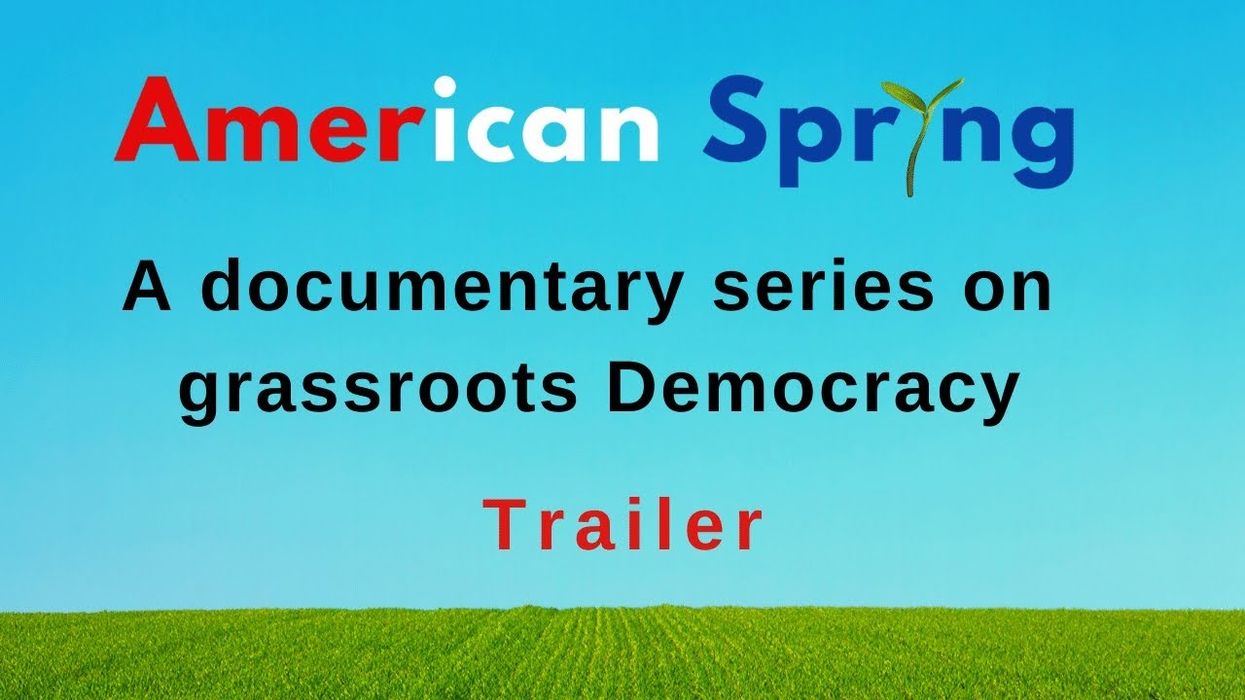This month the prestigious American Academy of Arts and Sciences released "Our Common Purpose: Reinventing American Democracy for the 21st Century," which outlined many of the issues the nonpartisan democratic reform movement embraces.
While covered fully on this site, a simple internet search shows the report barely got a mention from the major national media outlets.This failure is just one example of the journalism profession's apparent lack of interest in the structural problems that are perverting our democratic republic.
To partially remedy this years-long media blackout, I set out to craft short documentaries about various reform issues and the people involved with them, so that reform advocates could act in place of the media in sharing stories about political reform with the American public. The result is "American Spring," a series of 10-minute documentaries about the "green sprouts" of the reform movement as we transition into the digital age. The content will be made available free for both offline and online viewing events hosted by groups or individuals.
There is an inherent power in storytelling that can engage and motivate people to action. But without the media telling stories about the flaws in our political system, the American public will never understand the value of "process" reforms such as ranked-choice voting, turning redistricting over to independent commissions, or public financing of campaigns.
Of course, the proof is in the pudding. So please give one of the first three episodes a sample and see if it engages you into watching more. The initial stories look at Maine's ranked-choice voting experience two years ago, Michigan's citizens movement to end partisan gerrymandering and Connecticut's successful public campaign financing program.
Future episodes — with one slated for release in August — will look at the ticking time bomb our election system has become, the existential threats liberal democracy faces in the digital age, and paradigm-shifting concepts regarding civic engagement that will be required to combat an emerging digital tyranny.
The brief documentaries blend original stories with commentary by experts including two-time Pulitzer Prize winner Hedrick Smith and activists such as Katie Fahey, who orchestrated the grassroots movement against political mapmaking. Interviews include representatives from RepresentUS, Open Democracy, the Brennan Center for Justice and American Promise — along with other grassroots activists, academics and elected officials.
As someone who has done a fair share of political organizing over the years, I hope these easy-to-digest but provocative pieces become a new tool for an age-old problem: How to recruit volunteers and sustain grassroots activism?
For example, groups can host online forums — or, hopefully soon, in-person events — to show one or more episodes as introductions before panel discussions, which could then segue into local calls to action to advance a reform issue.
Alternatively, they could help local civic engagement organizations with regular meetings. They're often looking for ways to attract new members and keep their gatherings fresh. They could show an episode and follow up with a discussion, before moving on to the business at hand. Resource materials are being developed to facilitate discussions and, ideally, will provide national and local opportunities that volunteers can plug into.
This is not meant to be stand-alone content used just for internet viewing, but an integrated tool to help build support for democracy reform. But internet viewing is a good place to start and reform organizations can request the files for free — so they can run directly on their own social media platforms.
The idea already seems to be catching on; groups that have committed to using the documentaries include such democracy reform mainstays as FairVote, Open Democracy, The People, Democracy Matters and the Election Reformers Network. I hope additional organizations view the content and find value in it as a way to educate constituencies and build up capacities. An organization can also request the episode be tagged with their URL information as well.
If there is interest in this approach, a free "Democracy Film Festival in a Box," turnkey product could be created that would also include my 2017 film "Democracy Through the Looking Glass."By January, this "festival in a box" should consist of 150 minutes of compelling content about the future of American democracy and the role citizens must play in correcting our current course.
But here's the spoiler alert: The role of citizens is simple. We need to learn what a liberal democracy means and fight for those values as we face the turbulent times ahead. This is my contribution.



















